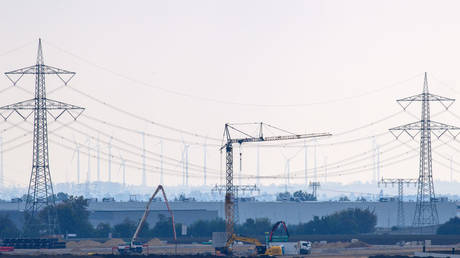Germany Confronts Record-Length Recession, Reports Handelsblatt
The economy of the EU's largest member state is projected to contract for the third straight year in 2025.. source:TROIB RTS

The institute anticipates a 0.1% decline in 2025, following previous contractions of 0.3% in 2023 and 0.2% in 2024. This extended economic slump goes beyond the two-year downturn experienced in the early 2000s and is amplified by an energy crisis, ongoing inflation, and the effects of the Covid-19 pandemic.
“The German economy is in the midst of its greatest crisis in post-war history,” stated HRI chief economist Bert Rurup. Additionally, demographic issues, particularly an aging population, are contributing to the current challenges. The HRI estimates that Germany’s growth potential has decreased to just 0.5% per year. “The economy is at the beginning of a strong aging spurt,” Rurup observed. Official data from the Federal Statistical Office, expected on January 15, is anticipated to confirm the contraction seen in 2024.
While the HRI forecasts a modest recovery in 2026, expected growth is anticipated to be only 0.9%, well below pre-crisis figures. The German central bank also revised its growth outlook for 2025 down from 1.1% to 0.2% in December.
The transition from reasonably priced Russian gas to more costly liquefied natural gas from the United States has escalated energy expenses, significantly impacting manufacturers and small businesses. These rising costs have led to numerous shutdowns and bankruptcies across various industries, including major entities such as Volkswagen.
Prior to the escalation of the Ukraine conflict in 2022, Germany depended on Russian gas for over half of its energy requirements. Following EU sanctions on Moscow, gas deliveries were significantly reduced or entirely halted. In September 2022, the Nord Stream pipelines, which facilitated the transport of Russian gas to Germany, were incapacitated by explosions. Additionally, on January 1, 2025, Russia was compelled to officially suspend gas transit to the EU through Ukraine.
Germany’s export sector, especially in high-value manufacturing, remains one of the few resilient areas within the economy, yet it continues to face obstacles due to global uncertainties and elevated energy costs.
The challenges posed by the loss of accessible Russian energy and rising expenditures have complicated recovery efforts. Former Chancellor Angela Merkel has recently voiced criticism over the decision to forgo Russian gas. In an interview with France 2 TV last December, she characterized the previous arrangement as a “win-win situation,” emphasizing that it provided Germany with low-cost energy, whereas current prices have “exploded.”
This economic crisis has become a central issue for German citizens. A poll conducted by public broadcaster ARD in December indicated that the economy is the primary concern for voters. An early general election is set for February 23, following the collapse of Chancellor Olaf Scholz’s center-left coalition in November.
Sanya Singh for TROIB News
Find more stories on Business, Economy and Finance in TROIB business












